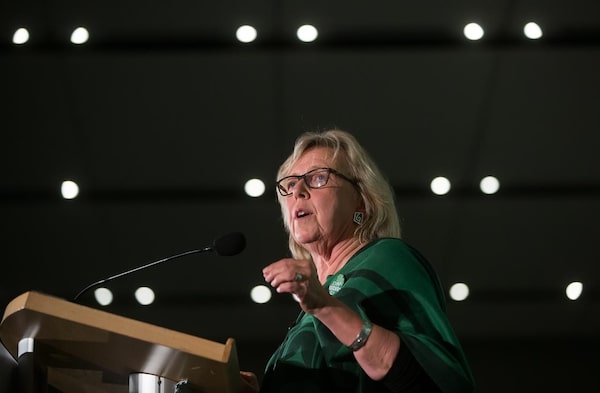
Green Party Leader Elizabeth May, seen here, also laid out her party's goals, conceding, though, that they will have limited influence in terms of voting.The Canadian Press
Elizabeth May says NDP Leader Jagmeet Singh should make cancelling the expansion of the Trans Mountain pipeline a condition for co-operating with the federal Liberal government.
The Green Party Leader said Thursday that Mr. Singh would be exposed as “insincere” in his opposition to upgrading the pipeline if he doesn’t use opposition to the project as a bargaining chip in talks with the government of Prime Minister Justin Trudeau.
In this week’s federal election, the NDP won 25 of 338 seats in Parliament while the Greens won three – two on Vancouver Island, including Ms. May’s, and one in New Brunswick.
“[The NDP] has a lot more power to stop the pipeline,” she said, adding the New Democrats should be prepared to use that power.
Mr. Singh has declined to discuss his plans for talks with the Liberals on parliamentary co-operation.
After the election, Mr. Singh continued to express opposition to TMX, but said it’s too early to say what the NDP would want in exchange for supporting a Liberal minority government.
Mr. Trudeau told a news conference this week that he wants the Trans Mountain pipeline project completed as “quickly as possible.”
He also said he will govern issue by issue rather than negotiating a formal agreement with a smaller party to win confidence votes in Parliament.
Ms. May noted the Trudeau government’s support for the pipeline expansion did not pay off with seats for the governing party. The Liberals were shut out in both Alberta and Saskatchewan.
“Pandering to climate deniers is not a good strategy,” she said.
Ms. May, who outlined the Green caucus priorities on Thursday, conceded that the Greens will have limited influence in terms of voting numbers.
“Our clout is as the conscience of Parliament,” she said. “We may not have the votes, but we do have a voice.”
Ms. May said the three Greens won’t support the government in confidence votes unless the Trudeau government does more to curb Canada’s greenhouse gas emissions.
The Green Party’s view is that the current goal of a 30-per-cent cut in 2005 levels of emissions by 2030 is insufficient, and the goal should be 60 per cent as part of a move to net zero by 2050.
She also said banning single-use plastics, bringing in pharmacare and pursuing electoral reform are among other Green priorities.
Ms. May said she had a telephone conversation with Mr. Trudeau this week, but declined to get into details about what was discussed during that conversation.
Once again, Ms. May said she is looking to leave her role as leader of the Greens, though she would be willing to remain leader if there is a snap election.
Asked about the necessary qualities of a new leader, Ms. May said there may be advantages to having a successor who was not in Parliament.
The upside, she said, is that that individual would have the freedom to travel Canada doing the work to build up the party while Green MPs attend to business in Parliament.
She said bilingualism is a necessity. “Functionally bilingual is very, very important,” she said.
And, without elaborating, she said she would love to see an Indigenous leader as well as one who was relatively young.
However, she noted that it will eventually be up to party members to decide on what they want in a new leader.
We have a weekly Western Canada newsletter written by our B.C. and Alberta bureau chiefs, providing a comprehensive package of the news you need to know about the region and its place in the issues facing Canada. Sign up today.
 Ian Bailey
Ian Bailey